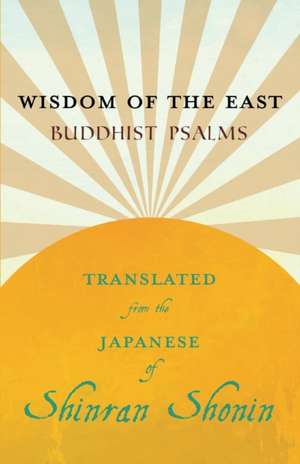Wisdom of the East - Buddhist Psalms - Translated from the Japanese of Shinran Shonin
Autor S. Yamabe, Shinran Shonin Traducere de Adams L. Becken Limba Engleză Paperback – 17 apr 2019
Preț: 124.07 lei
Nou
Puncte Express: 186
Preț estimativ în valută:
23.74€ • 24.85$ • 19.64£
23.74€ • 24.85$ • 19.64£
Carte tipărită la comandă
Livrare economică 05-19 aprilie
Preluare comenzi: 021 569.72.76
Specificații
ISBN-13: 9781528712903
ISBN-10: 1528712900
Pagini: 104
Dimensiuni: 140 x 216 x 7 mm
Greutate: 0.14 kg
Editura: Read Books
ISBN-10: 1528712900
Pagini: 104
Dimensiuni: 140 x 216 x 7 mm
Greutate: 0.14 kg
Editura: Read Books
Notă biografică
Japanese Buddhist monk Shinran Shonin was born in Hino (now a portion of Fushimi, Kyoto) on May 21, 1173, at the stormy end of the Heian period, and lived during the Kamakura period. He died on January 16, 1263. Hen's student Shinran founded the Japanese Buddhist sect that would later become known as Jodo Shinshu. Shinran Shonin was born in 1173 to Lord and Lady Arinori, from a branch of the Fujiwara clan. In 1181 he entered the Sh?ren-in temple near present-day Maruyama Park in Kyoto at age nine. Became a disciple of H?nen in 1201 and attained enlightenment through Amida's Vow. In 1207, H?nen Shinran was stripped of his monastic name and exiled after being accused of using nembutsu practice as a cover-up for sexual liaisons. Having been stripped of monastic identity, Shinran came to understand himself as neither monk nor layman. His most significant work, Kyogyoshinsho, is a series of selections and commentaries on Buddhist sutras. In 1234 Shinran returned to Kyoto with his daughter Kakushinni but disowned his eldest son Zenran. On March 14, 2008, a little wooden figure at the Jrakuji temple in Shimogy-Ku, Kyoto, was discovered to contain what is thought to be some of Shinran's ash remains.
